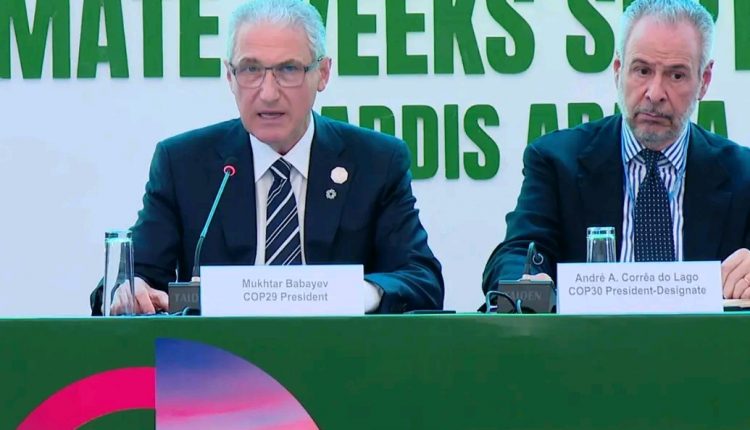COP29 President Calls for Climate Justice as Africa Bears Brunt Despite Minimal Emissions
Addis Ababa, September 6, 2025 (FMC) – COP29 President Mukhtar Babayev today underscored the urgent need for climate justice, highlighting that Africa contributes the least to global greenhouse gas emissions yet suffers disproportionately from climate impacts.
Speaking at a high-level ministerial event during the second UN Climate Week in Addis Ababa, President Babayev emphasized that communities across the continent are already experiencing extreme heat, erratic rainfall, droughts, floods, and advancing desertification. He stressed that prompt action to adapt and address loss and damage is both critical and urgent.
“Africa’s forests, savannas, and wetlands are indispensable to global climate stability,” he said, further noting that the continent’s vast solar, wind, hydro, and geothermal potential positions it to lead in nature-based solutions and renewable energy, provided that robust frameworks and partnerships are in place.
President Babayev called for greater recognition of Africa’s immediate needs and extraordinary potential, urging that COP29 outcomes be effectively implemented across the continent. He reaffirmed the COP29 presidency’s commitment to ensuring that donor pledges are honored, emphasizing accountability as a cornerstone of progress.
“The Baku finance goal provides a new benchmark to hold donors accountable. We are finalizing our joint mandate and roadmap to mobilize \$1.3 trillion in climate finance,” he stated.
Echoing the call, Ethiopia’s Minister of Planning and Development, Fitsum Assefa, highlighted Africa’s rich renewable energy resources, its dynamic and innovative youth population, and its vision for sustainable growth as assets that can inspire global climate action.
However, Minister Fitsum stressed that unlocking this potential requires robust technology transfer, capacity building, and access to climate finance to advance renewable energy deployment, strengthen climate-smart agriculture, and scale nature-based solutions.
“A reformed global financial architecture is essential to reduce the cost of capital and catalyze green investments across Africa,” she said. “With the right support, the continent can lead in delivering climate solutions—not only for itself but for the benefit of all humanity.”
Minister Fitsum underscored that climate finance accessibility must remain a priority worldwide, particularly for Africa. She called on the UNFCCC to recognize the continent’s unique circumstances—not as a privilege, but as a matter of fairness, equity, and climate justice. Tailored support and consideration in global negotiations are essential to secure a just and resilient future.
She emphasized that Africa should not be portrayed solely as a victim of climate change, but also acknowledged as a source of innovative climate solutions, evident across the region though often overlooked. Ethiopia, she noted, offers a practical model of climate-resilient and green development, exemplified by the Green Legacy Initiative and the Corridor Development Project.
Minister Fitsum highlighted three pressing priorities for Africa: recognition of bold climate policies and actions, scaling up predictable and accessible climate finance, and mobilizing investment to adapt to shocks while leapfrogging toward low-carbon development. She called for strengthened collaboration to ensure Africa occupies its rightful place in global climate negotiations, enabling a more resilient, just, and prosperous future.
Ambassador Amr Aljowaily, Citizens and Diaspora Director at the African Union Commission, reinforced the need to translate international solidarity into concrete action, urging partners to move beyond pledges and deliver tangible results.
He further noted that Africa’s development remains uniquely vulnerable to climate shocks, jeopardizing decades of progress in poverty reduction and stability. “It is vital that Africa’s voice is heard in global climate discussions, as the continent contributes less than four percent of global emissions yet bears the brunt of severe climate impacts,” Ambassador Aljowaily emphasized.
Highlighting the African Union’s commitment to climate action, he pointed to initiatives such as Agenda 2063, which prioritize renewable energy and climate-resilient agriculture. He also called for acknowledgment of Africa’s special circumstances in international climate agreements, fulfillment and scaling of climate finance commitments, balanced allocation of resources between mitigation and adaptation, reform of global financial structures, and targeted investment in Africa’s renewable energy potential.

